Desktop vs. Laptop Gaming with the RTX 2070
Since the launch of Nvidia's RTX GPUs nosotros've been intrigued nearly the operation difference between the laptop and desktop variants of the graphics bit. Different with previous generation Pascal GPUs, in that location is a gap in the specifications betwixt GeForce twenty series products designed for power constrained laptops and GeForce twenty detached GPUs aimed at fully-fledged gaming desktops.
Now the get-go thought that may come to mind is: why run this analysis? It is obvious that desktop PCs offer better performance and value, so do nosotros really need to drop a keen big turd on laptops? Only that's not our intention.
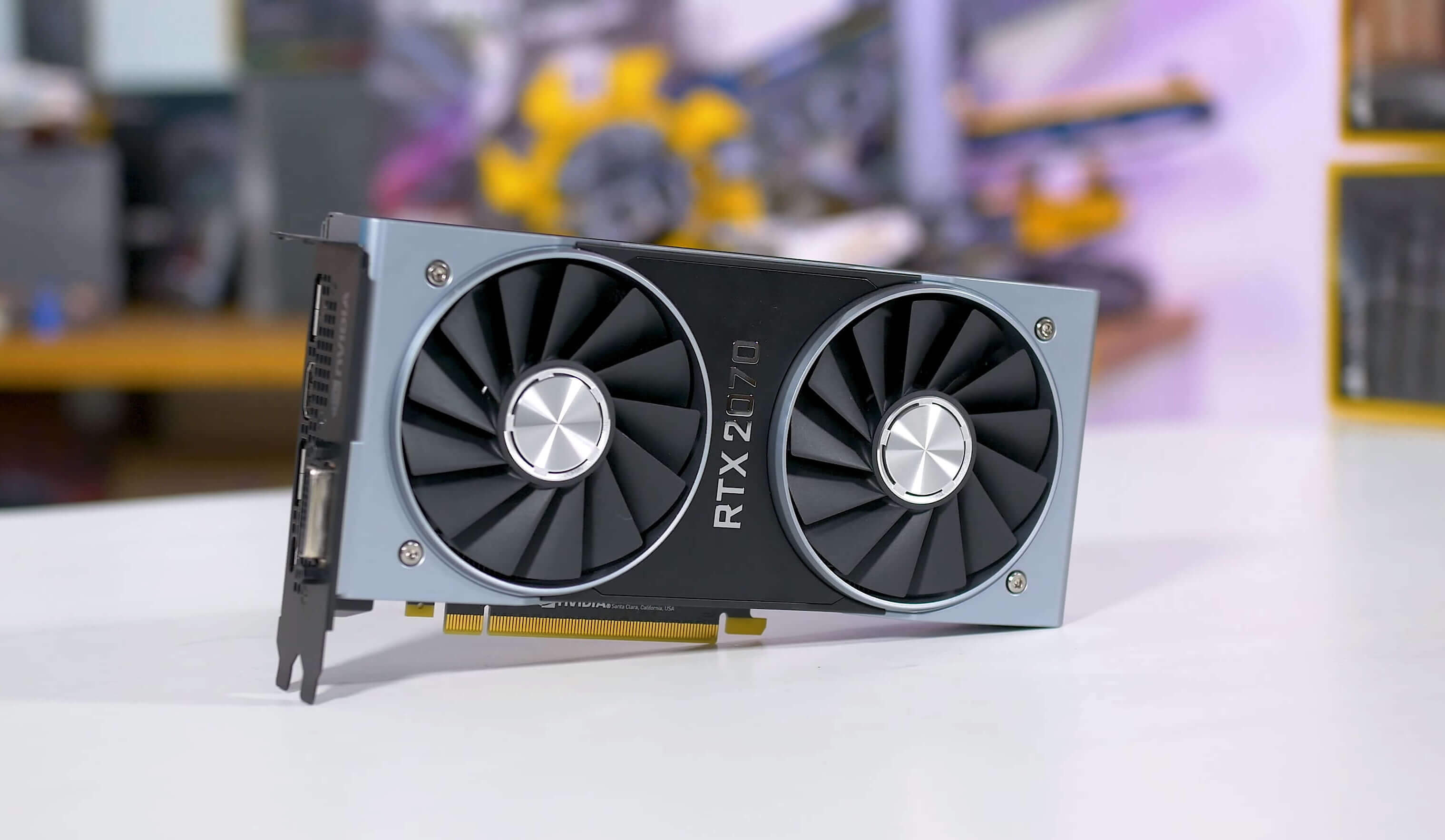
Gaming laptops take earned their place in the market and that's not upwards for argue. The thought is to show laptop buyers exactly how their systems will differ to a typical gaming desktop, which we believe is especially relevant when Nvidia's naming scheme has muddy the waters a bit. So allow's revisit the GeForce twenty series for laptops and focus on the RTX 2070 which is the flake nosotros'll be benchmarking today. Despite using the exact same name on laptop and desktop, the RTX 2070 laptop variant is clocked lower. It has the aforementioned CUDA core count and same retentiveness configuration, just the boost clock is 180 MHz lower. Straight abroad the desktop card is thirteen percent faster in games that are shader limited, provided this clock beliefs plays out in the existent world.
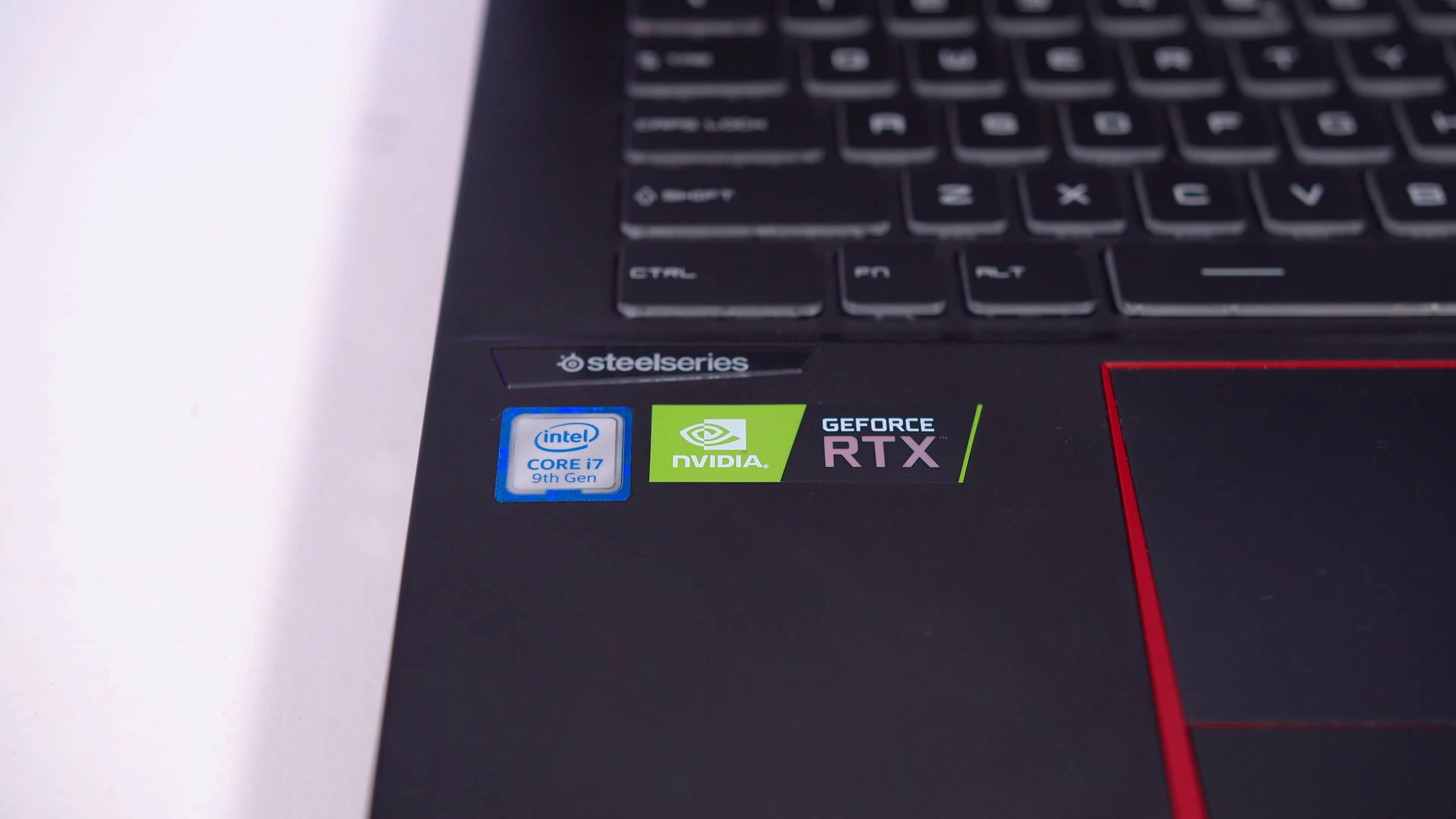
Today's examination is very uncomplicated: nosotros've taken an RTX 2070 laptop and compared information technology to an RTX 2070 desktop in a range of games. We haven't attempted to make this a super apples-to-apples comparison where we lock down the desktop's hardware to directly compare the GPUs, because in reality in that location are many other factors that give performance advantages to desktops in real world scenarios, and that's what we're going for.
For instance, laptops are limited to DDR4-2666 retentivity whereas nearly PC builders will be using at least DDR4-3000 considering it's roughly the same cost. For our exam that'southward the speed deviation we're seeing, both with dual-channel 16GB kits.
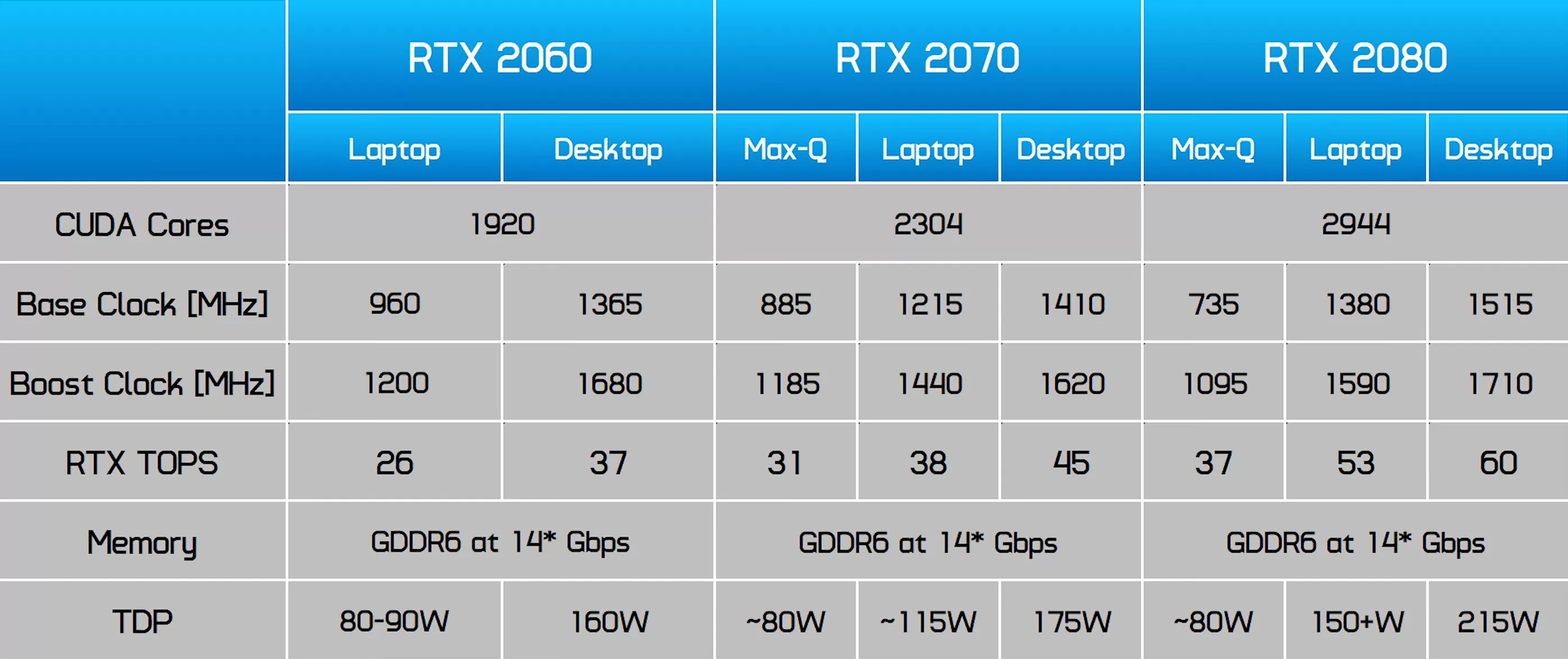
Merely the bigger story is the CPU, well-nigh gaming laptops are limited to 45W CPUs and in 2022 will use the Core i7-9750H. This is a 6 core, twelve thread CPU that's rated at a ii.6 GHz base and 4.i GHz all-core heave. However due to that ability limit, the i7-9750H oftentimes sits in the mid 3 GHz range when fully utilized. In contrast, lots of desktop builders will choose something like the Cadre i7-8700K, which has a much higher 95W TDP and hands exceeds that on a regular basis. It's clocked at a 3.vii GHz base and boosts upward to 4.3 GHz all-core, with typical behaviour seeing that CPU sit locked at 4.3 GHz in a multi-threaded workload. From what I've seen the 8700K is usually clocked 1 GHz college or thereabouts.
Nosotros could have called something much closer to the Cadre i7-9750H on a desktop, like the 35W Cadre i7-8700T, but we idea it was more appropriate to apply one of the most pop six-core, twelve-thread gaming CPUs in the i7-8700K. We could accept also chosen to beef information technology up more with an 8-cadre Core i9-9900K, but for gamers the $370 8700K remains one of the better choices and we chose to stick to vi cadre models, then we can see how a six-core laptop fares against a six-core desktop.
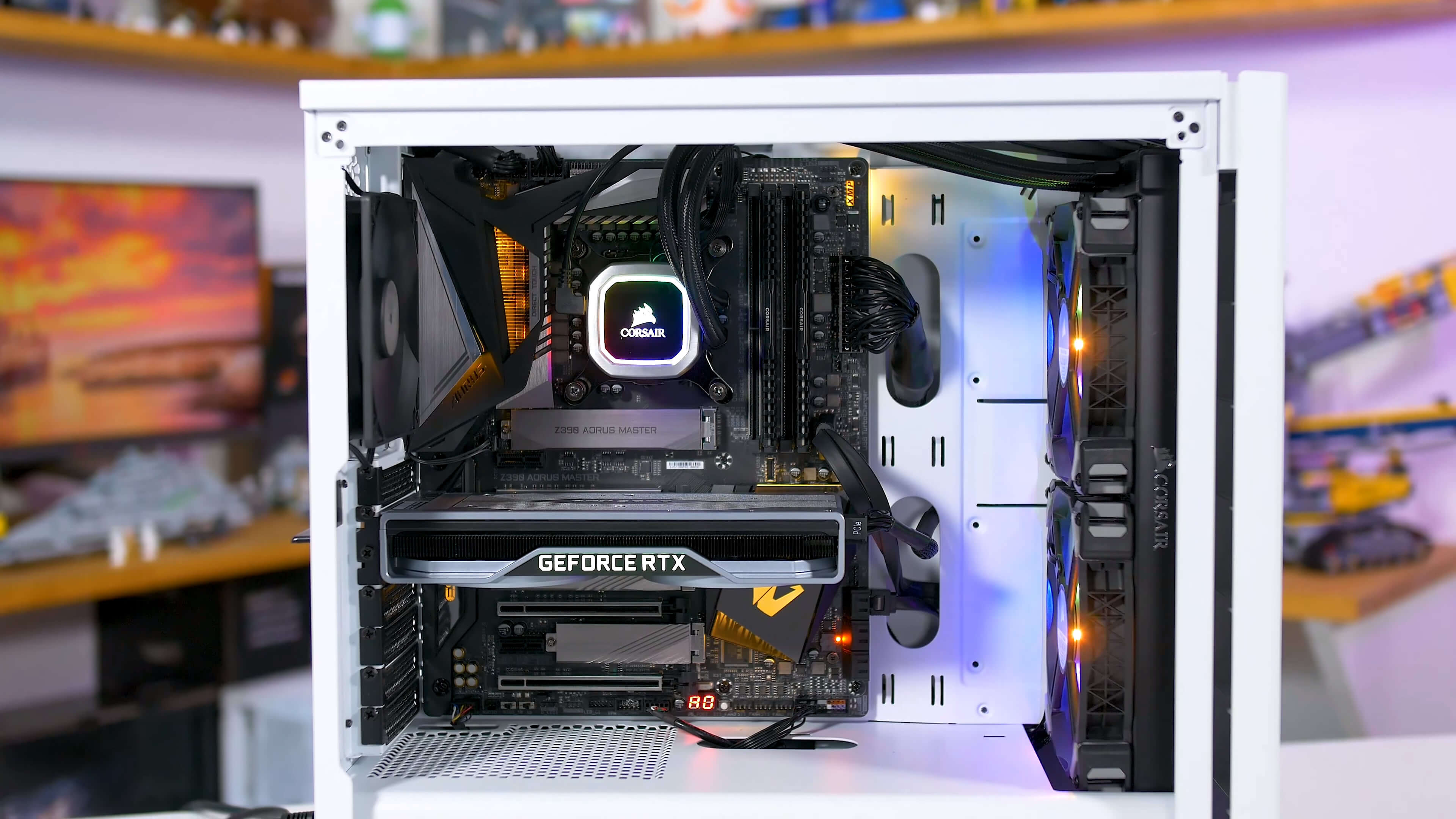
The laptop used for benchmarking is the MSI GE75 Raider 9SF which is equipped with a RTX 2070 GPU, Cadre i7-9750H, 16GB of DDR4-2666 and a 1080p brandish. The desktop was congenital using a RTX 2070 Iron inside, plus a Cadre i7-8700K running stock and 16GB of DDR4-3000. Nosotros as well tested with a 1080p brandish hooked up. And as a quick note, the Founders Edition RTX 2070 is clocked even higher against the laptop variant – 19% college rather than 13% – just this the same clocks as many other factory OC cards that people buy.
Performance
Kicking the testing off with Metro Exodus and… it's non looking too bad for the gaming laptop. Information technology is beaten by the RTX 2070 desktop, but only by eleven pct looking at average framerates and xiv percent looking at ane% lows. And then despite the RTX 2070 desktop bill of fare having nigh a 20% clock speed reward, the real world impact in Metro is somewhat limited which is nice to see.
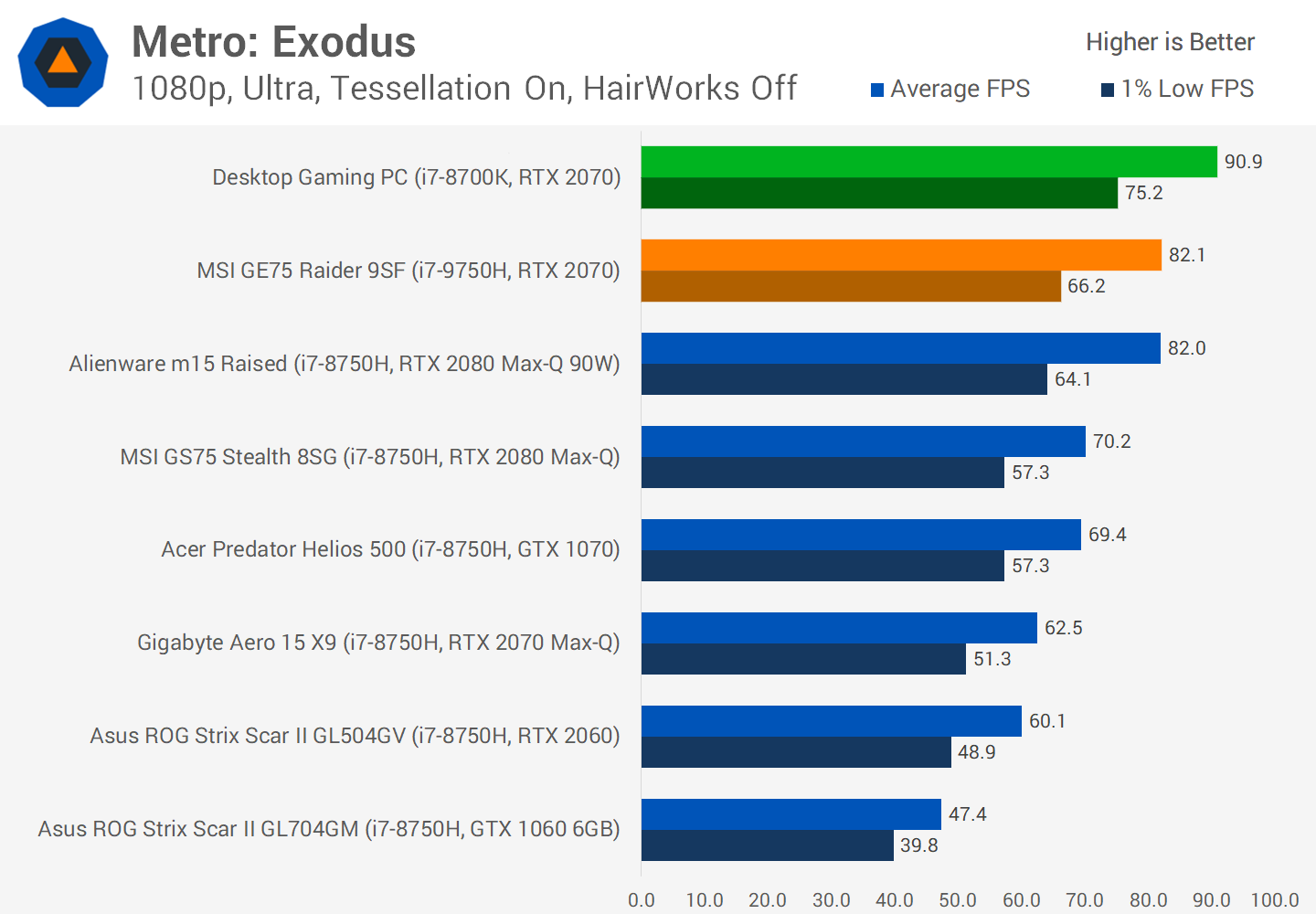
Simply things can also go in the consummate opposite direction. In Resident Evil 2 the desktop RTX 2070 beats upwards on the laptop variant to the tune of 33 percent, which is a whopping margin. Given we are looking at frame rates well above 100 FPS here, we suspect this is a tag-team job with the faster 8700K also lending some aid to remove CPU bottlenecks.

Hitman ii is known to exist a CPU demanding title and that plays out similarly to Resident Evil two, delivering a huge 34% reward to the desktop system, although this diminishes to merely 22% when viewing one% low functioning.
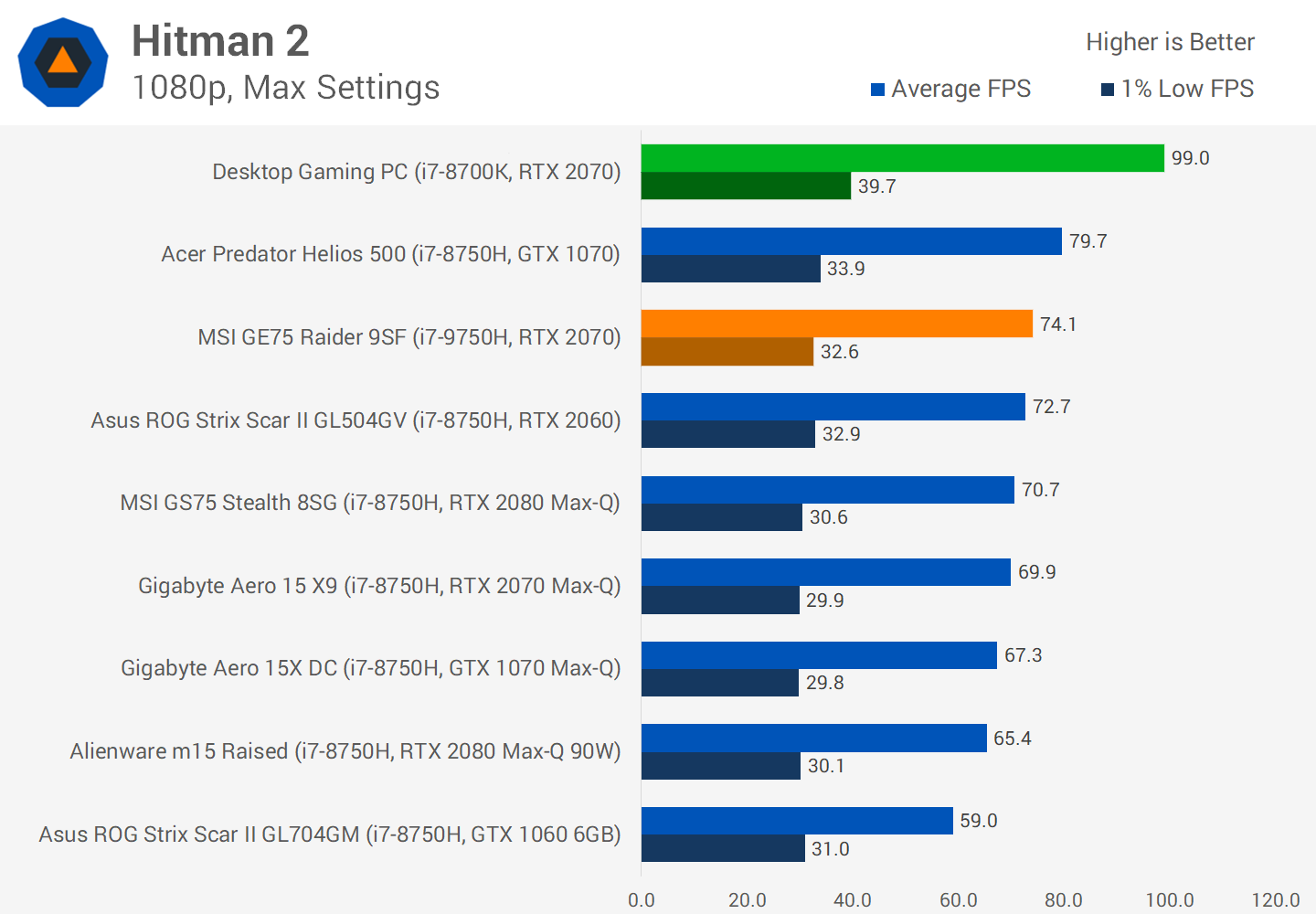
Battlefield V is an interesting situation. When looking at boilerplate performance nosotros run into the desktop pull ahead past a reasonable 12 percent, aught that's going to make laptop owners cry. Simply in 1% low performance, information technology'southward clear the desktop is providing a smoother and more consistent experience with a 29% higher 1% low. Once more, things like faster memory and a faster CPU help the desktop here significantly whereas laptops tin can feel a little stuttery at times.

The Assassin's Creed Odyssey results surprised us a little bit considering we know this tin as well be a very demanding title. However, the desktop is a mere fifteen pct faster which doesn't seem too bad up confronting results like Hitman 2 or Resident Evil 2. There besides isn't much difference in frame charge per unit stability betwixt the two systems.

In Far Cry 5 nosotros're back out to effectually that nineteen percent margin with a 14 percentage comeback to 1% lows in favor of the desktop system. So this is bang on the deviation in clock speeds and adequately representative of the typical differences.
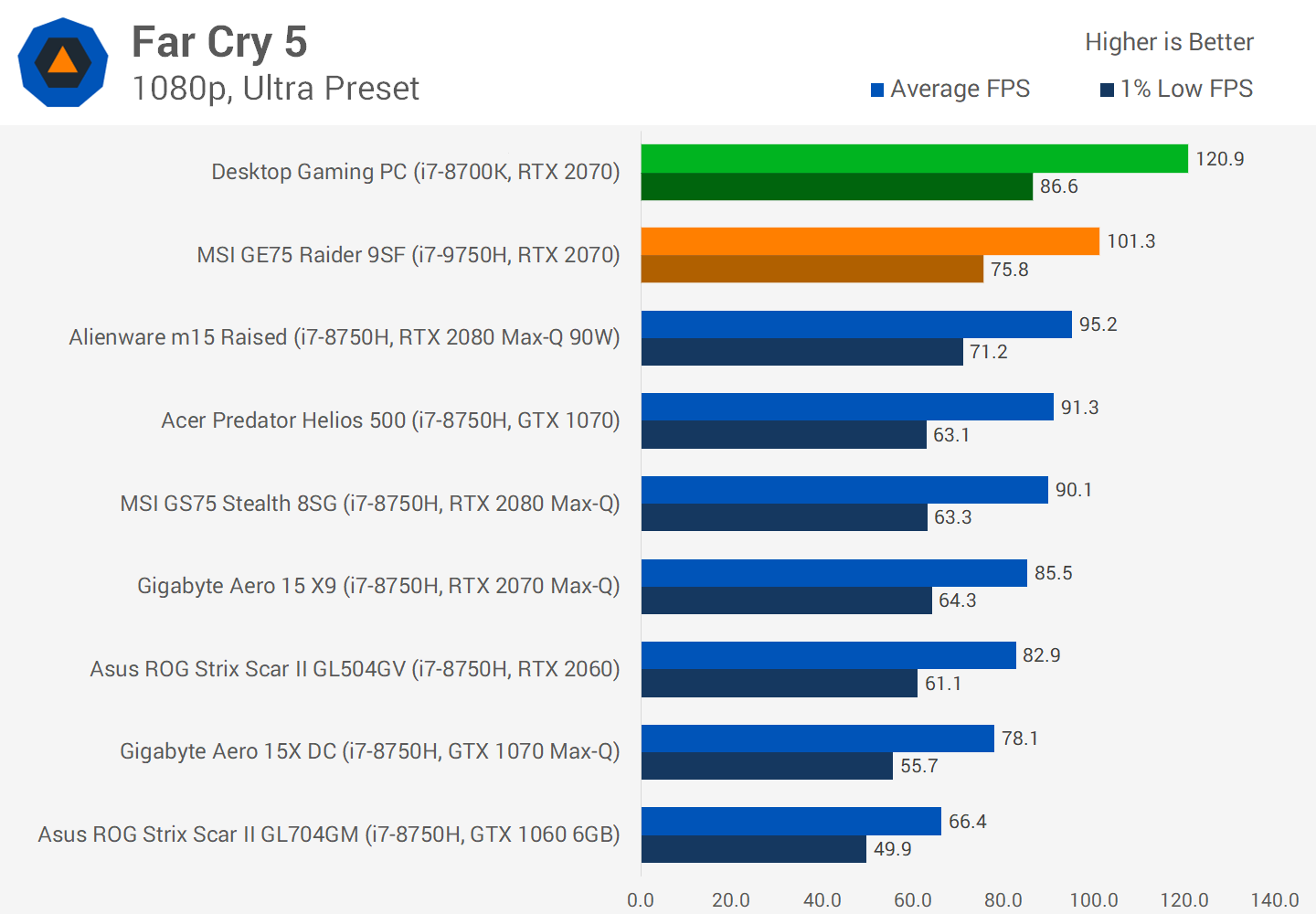
Star Wars Battlefront Two like with Battlefield is some other game that benefits from much better 1% depression performance on the desktop. One percent lows are 25 per centum college hither, compared to merely a 16 higher average frame rate over again in favor of the desktop arrangement.
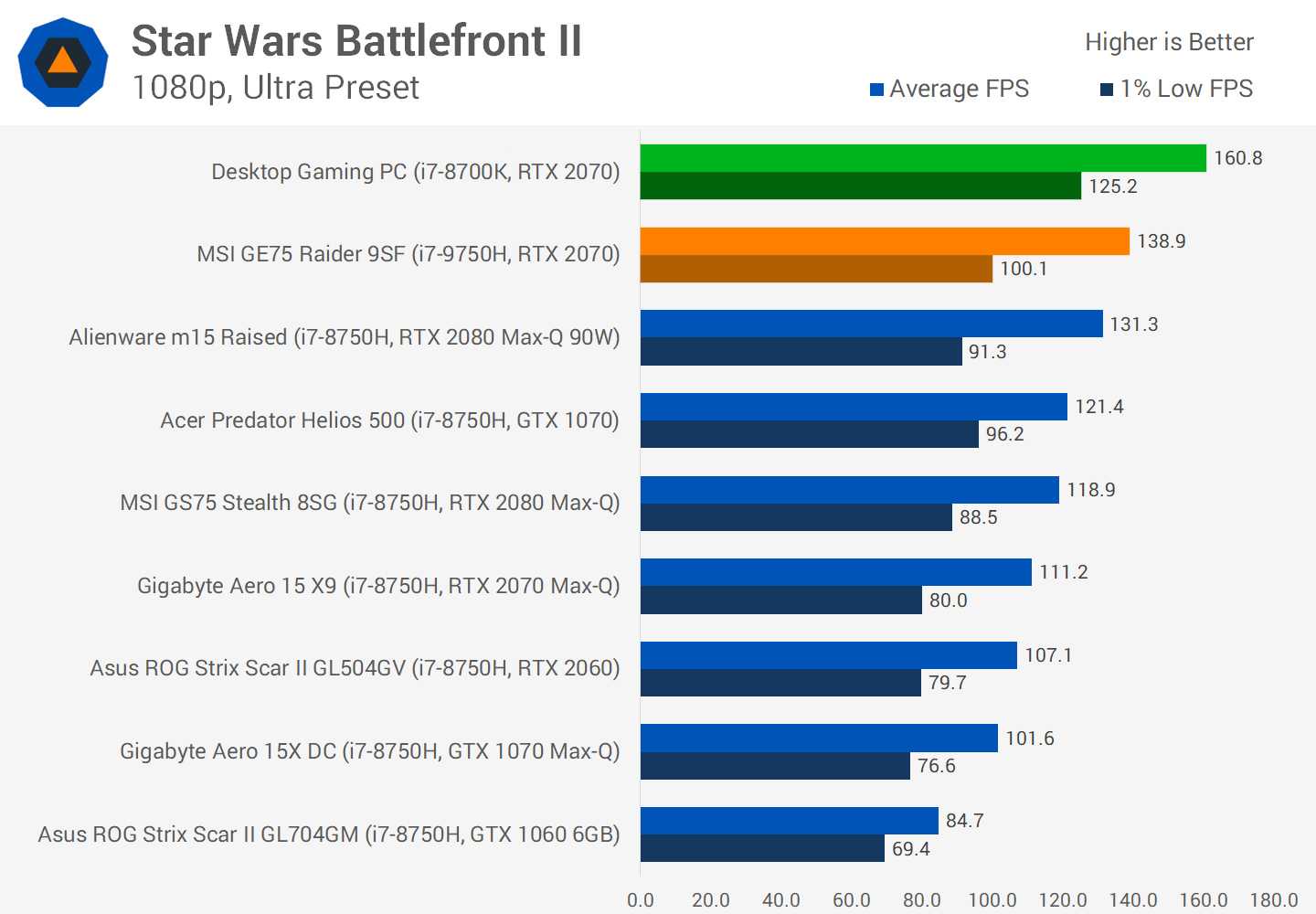
Watch Dogs 2 is another i of those games that tends to struggle on laptops due to its heavy GPU and CPU requirements. It's no surprise to meet much higher gains to 1% lows than average framerates when comparing the two systems.
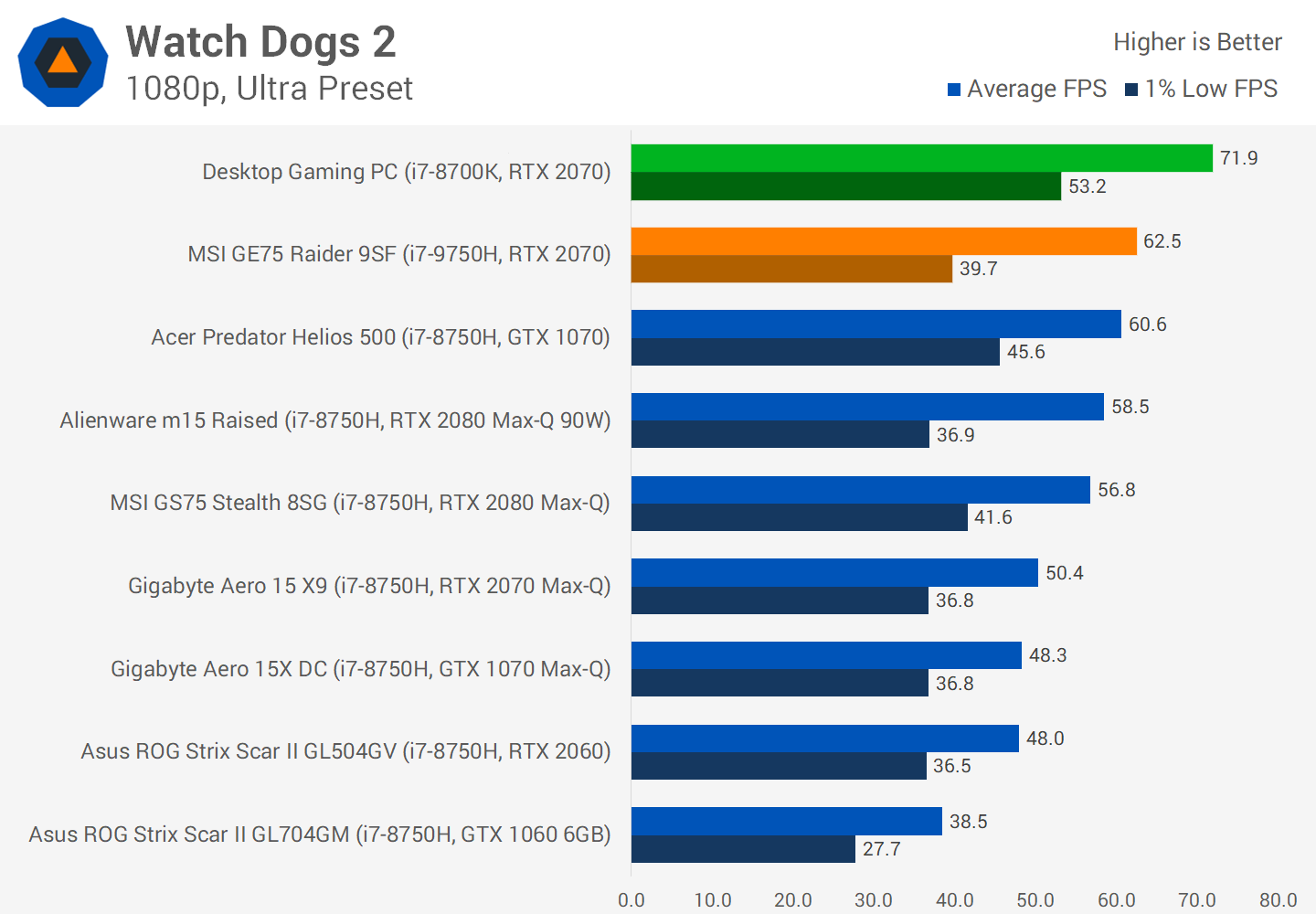
Shadow of the Tomb Raider is an interesting example and one of the worst for the laptop. The average frame rates are 32 percent college on the desktop system, just the ane% lows are more than twice as loftier. The laptop has noticeable stuttering during some areas of the benchmark run, whereas the desktop does not. We benchmarked this set of data at to the lowest degree ten times because we weren't convinced about these margins, just every time the desktop absolutely smoked the laptop.

Closing out with Grand Theft Auto V, the oldest title we tested but also a quite pop ane all the same. The desktop RTX 2070 holds a 17 percentage advantage in boilerplate frame rates but the harm to one% lows is limited to only 10 percentage which is i of the smallest differences we've seen so far.

Performance Breakdown
RTX 2070 desktop vs. laptop GPU
Here is the full breakdown comparison the RTX 2070 in desktop vs. laptop beyond the games we just talked nigh plus a few extras thrown into the mix. When comparing boilerplate frame rates, nosotros're left with the desktop clocking in 19 percent faster on average. Coincidentally, this is identical to the deviation in clock speeds.
Now, nosotros say coincidentally considering when we get a nineteen pct clock speed improvement on paper information technology'southward typical to encounter possibly a fifteen to sixteen per centum real earth performance gain. And equally you tin see, a lot of titles fall into that subclass consistently. However the boilerplate gain is boosted by a few outliers that do good from the desktop PC's advantages in other areas like CPU operation.
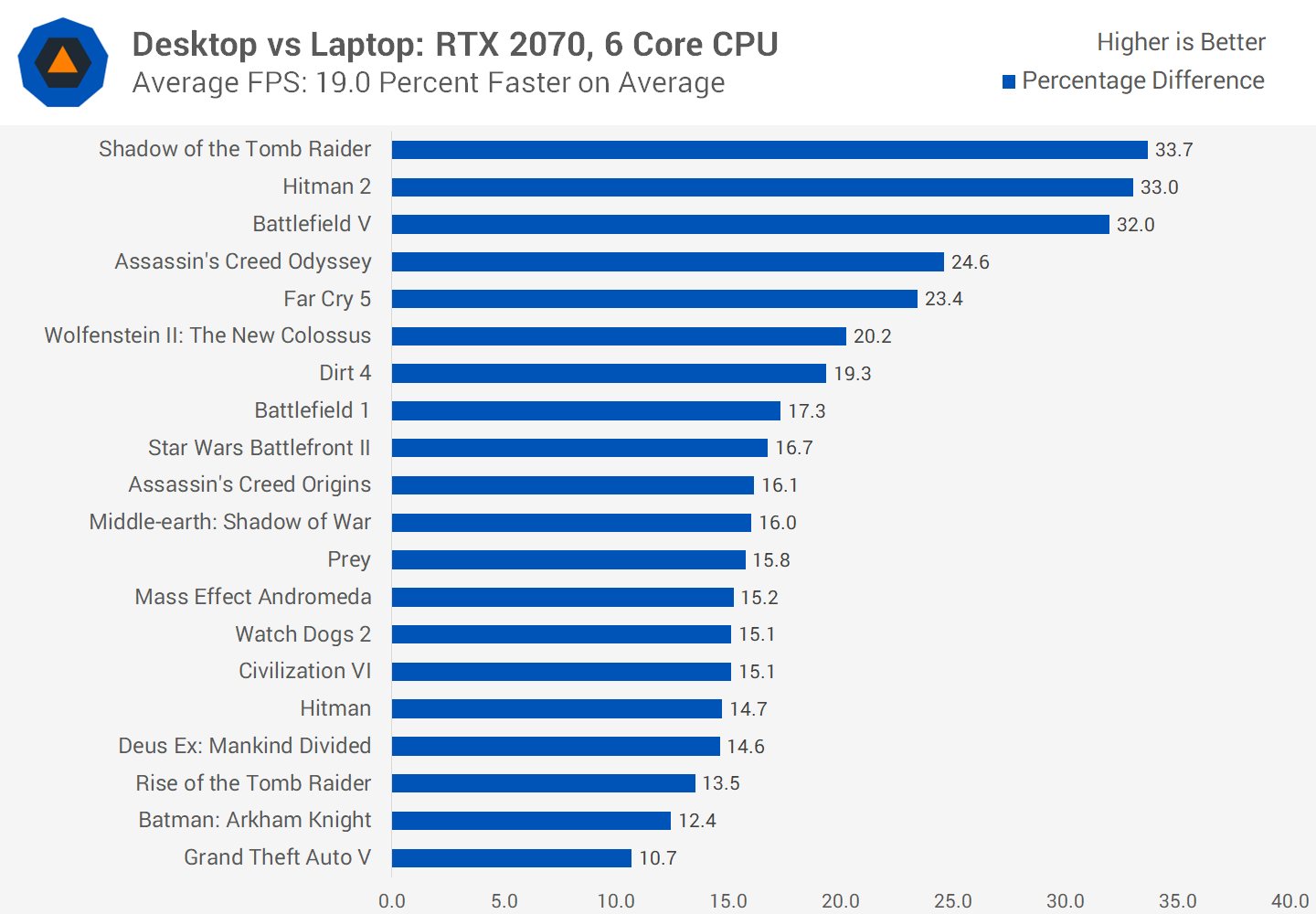
When comparing the ane% low operation things are all over the place. At that place are titles where the deviation isn't large, around 11 to 13 pct in favor of the desktop. But so in that location are some meaning outliers like Shadow of the Tomb Raider and Deus Ex Flesh Divided where the desktop is twice as fast in this crucial metric. An i% low average of 34 percent with this sort of variance is not all that useful.
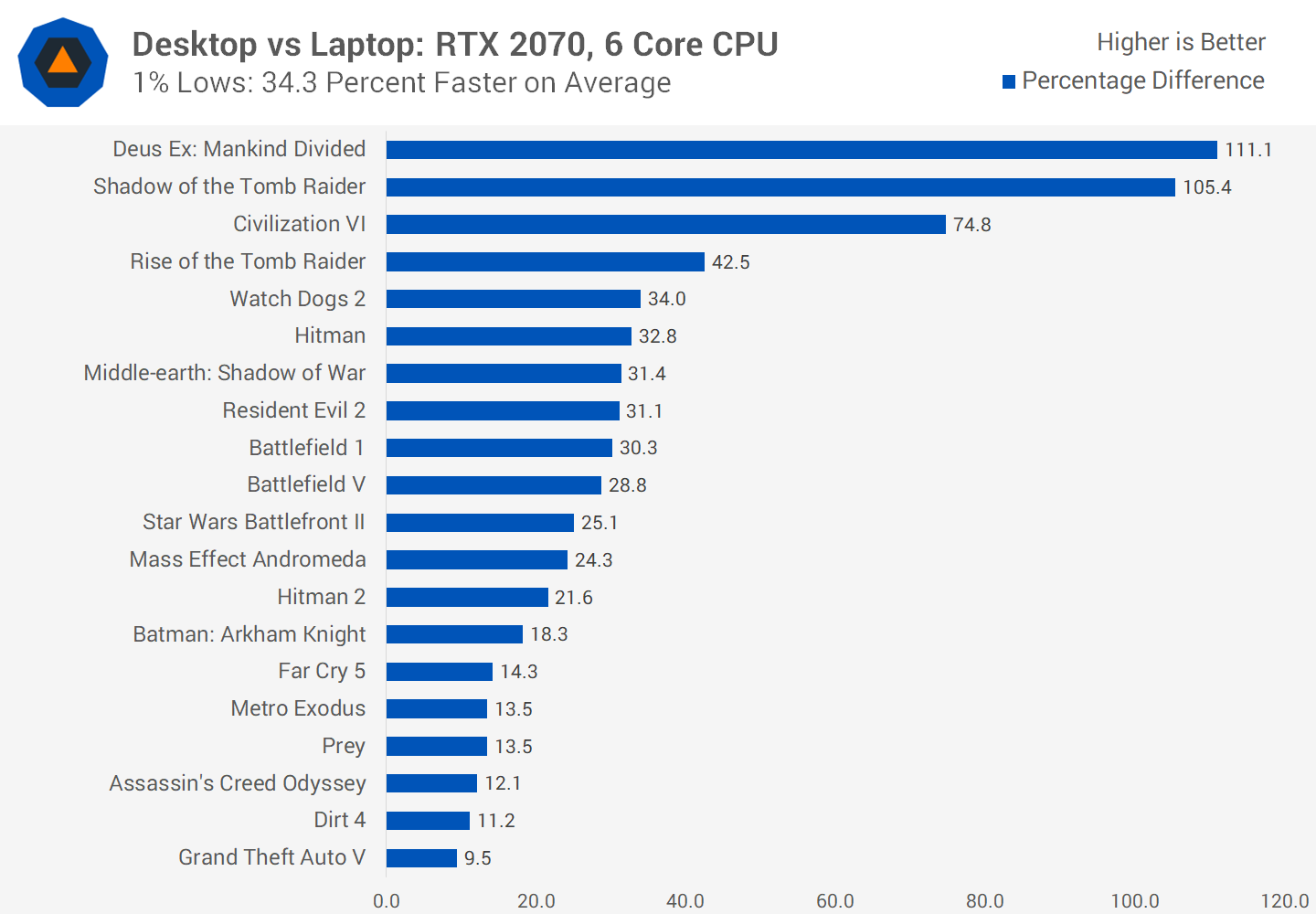
RTX 2070 desktop vs. RTX 2070 Max-Q laptop GPU
We haven't discussed Max-Q laptops thus far, although we have a dedicated review to it. We idea we'd throw this data in hither also for good measure out. The Max-Q model is designed for even more power constrained systems, typically sparse and light machines where cooling is express, and thus is clocked considerably lower than the desktop and standard laptop variants. On average, the RTX 2070 for desktops is 42 percent faster. While this margin is enormous, at least the Max-Q model has a different name.
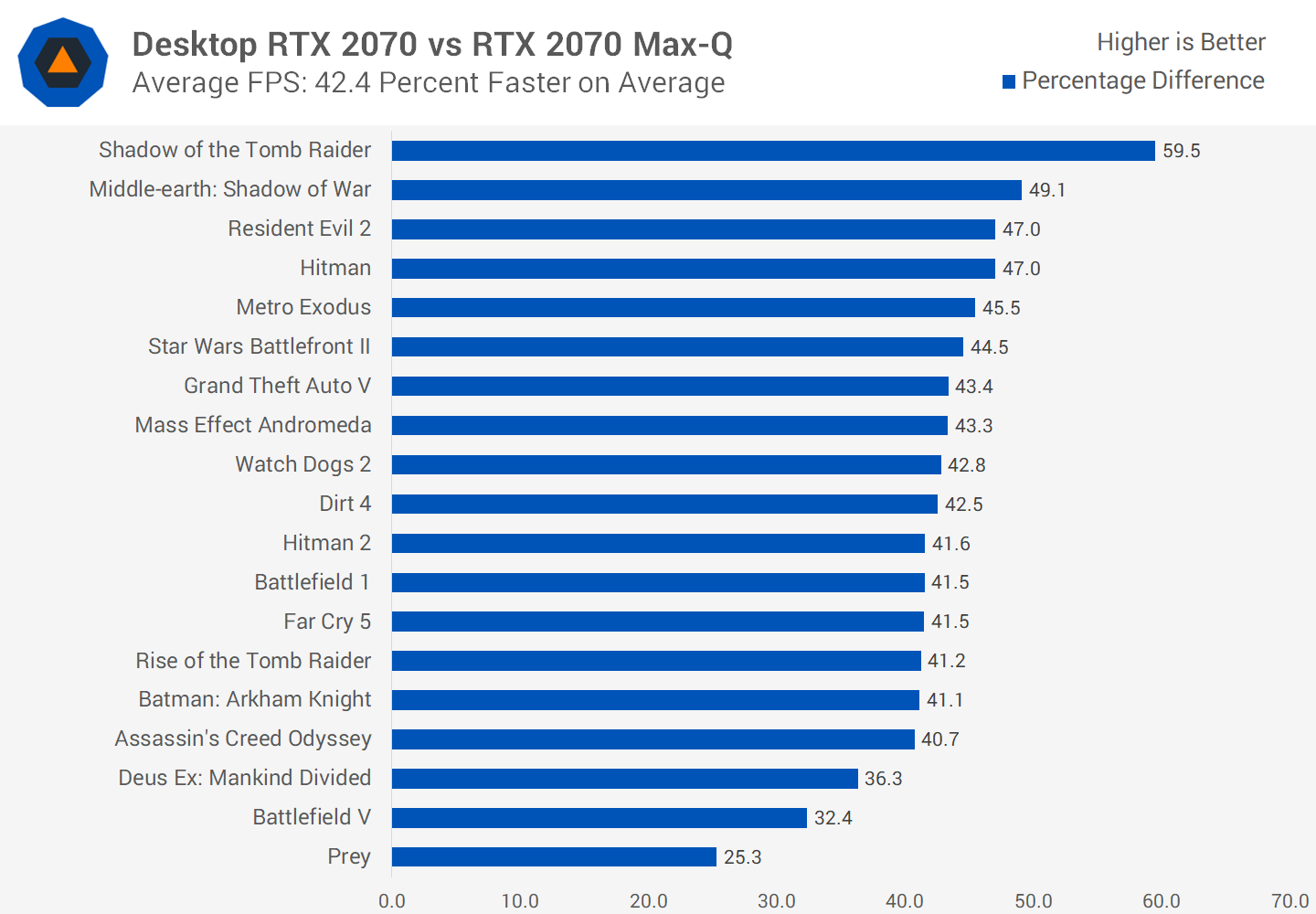
Closing Thoughts
In a nutshell, the desktop RTX 2070 was clocked xix percent higher in our test configuration than the laptop RTX 2070 and performed nineteen percent better on average. While GPU Boost does play around with clock speeds, there'due south not some magical wizard in the background boosting the laptop model up to the level of the desktop bill of fare. The difference in clock speeds on paper plays out in the real world.
While this is generally the example, in that location are also times where a desktop's other advantages assist with performance. A faster, less power constrained CPU helps with 1% low performance, as does faster memory, depending on where the bottlenecks lie. Better cooling capabilities allow the desktop to cope with a wider range of operating conditions without throttling. And, of course, the desktop has much higher telescopic for overclocking, which is typically express or non-real in laptops.
Just all of those factors are known. If you lot put an 8700K in a desktop, it will perform better than the lower clocked i7-9750H. Of course, a much larger desktop has amend cooling. But the everyday user and prospective laptop buyer might non realize that the RTX 2070 GPU in a laptop is non the same as the desktop analogue, and so you can't expect the same performance.

Aside from our complaints with the naming conventions of this GPU generation, the other aspect to consider when comparison desktops and laptops is value. Desktop PCs are non only faster, just usually cheaper, even when factoring in peripherals that are integrated into the laptop form factor.
The exact RTX 2070 test arrangement nosotros used costs around $1,700 to build, and then you can throw in a 1080p 144Hz brandish, mechanical keyboard and decent mouse for virtually $300 more and there you accept a $2,000 organization. MSI's GE75 Raider also costs $2,000, so at face value at that place'due south no difference in cost, but a handy functioning win to the desktop. Even so our test organization does have a few overkill components that are designed for testing college-end configurations. Y'all don't really need a Z390 Aorus Master or H115i Platinum for a standard build. Swap a couple of these components out with more reasonable stuff, and the entire arrangement price drops to $i,800. And then you end upwardly with marginal savings compared to the laptop and are left with better gaming performance.
That's non to say gaming laptops are pointless and in fact historically the comparison has been manner more lopsided to the desktop'southward advantage. What we have today are very capable gaming machines that you lot tin have with you, or ultrabook level machines that are good for work and play on the go. Information technology'south much easier to take effectually a laptop to various places, than it is to lug a desktop PC, monitor, keyboard and mouse. So what you sacrifice in performance and value, tends to go towards portability.
With that said, information technology'southward important to go on this trade-off in mind when tossing upward between a desktop and a laptop. We've heard endless stories or know of people that keep their gaming laptops planted on their desk at all times, never take information technology around and even claw up external peripherals like mayhap a college resolution display. These gamers shouldn't take bought a gaming laptop, instead should have gone down the desktop route. If you're non actively harnessing the portability attribute to gaming laptops, yous're missing out on valuable operation and upgradability.
Shopping Shortcuts:
- MSI GE75 Raider on Amazon
- Intel Cadre i7-9750H laptops on Amazon
- Intel Core i7-8750H laptops on Amazon
- RTX 2070 Laptops on Amazon
- GTX 1070 Laptops on Amazon
- GeForce RTX 2060 on Amazon, Newegg
- GeForce RTX 2070 on Amazon, Newegg
- GeForce RTX 2080 on Amazon, Newegg
- Radeon RX 570 on Amazon, Newegg
- Radeon RX 580 on Amazon, Newegg
Source: https://www.techspot.com/article/1849-desktop-vs-laptop-gaming-performance/
Posted by: thompsongation.blogspot.com


0 Response to "Desktop vs. Laptop Gaming with the RTX 2070"
Post a Comment